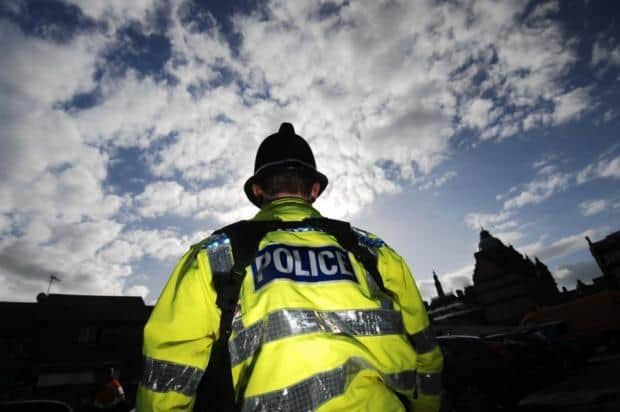Black people in Hertfordshire more than 3 times as likely to be arrested as white people
and live on Freeview channel 276
Black people in Hertfordshire are over three times more likely to be arrested than white people, new figures show.
Civil lobbying charity Liberty, which campaigns for justice and equality, accused the police of acting unjustly towards ethnic minorities and called on the Government to reduce police powers.
Advertisement
Hide AdAdvertisement
Hide AdHome Office figures show 502 arrests of black people were made in Hertfordshire in 2020-21.


This equated to an estimated 16 arrests per 1,000 black people in the area, based on population figures from the 2011 census.
In contrast, there were just 4.7 arrests per 1,000 white people, meaning a black person was 3.4 times more likely to be arrested.
Arrest rates were down from 2019-20 – before the coronavirus pandemic led to a fall in overall crime – when 18.9 arrests per 1,000 black people and 4.9 per 1,000 white people were made.
Advertisement
Hide AdAdvertisement
Hide AdAcross England and Wales, black people were 3.3 times more likely to be arrested than white people in 2020-21.
Assistant Chief Constable Matt Nicholls says that Hertfordshire Police are committed to delivering fair and proportionate policing and a county that is safe for everyone.
He said: “Stop and search is a necessary tool as part of fighting crime and helping to keep people safe. It is a challenging issue for policing and we recognise that it provokes strong feelings within the community, however nearly one in every three stop and searches in Hertfordshire leads to a ‘positive outcome’ - namely finding contraband or an arrest.”
“This shows that we are targeting its use effectively to keep people and communities safe.We work hard to make sure these powers are used appropriately and proportionately. Individual officers are held accountable for their actions and as an additional protection measure, the Police and Crime Commissioner has a scrutiny panel that makes sure these powers are being used responsibly.
Advertisement
Hide AdAdvertisement
Hide Ad“We have also worked for many years to build strong relationships with black and other minority groups to help build trust among all communities that they will be treated fairly and without discrimination.
“Our dedicated neighbourhood teams are a visible presence in every community, who actively engage with residents from all backgrounds on a daily basis. They work through our Community Advisor network to make sure we hear the voices of diverse groups within the constabulary and that we understand their needs and the issues that affect them. Our specialist hate crime officers support victims of race hate crimes, while our ‘gangs and schools’ team work with young people from all backgrounds, who are at risk of slipping into criminality.
A new anti-racism policy launched across Beds, Cambs and Herts forces in April this year, aims to embed a zero -tolerance approach to discrimination in the workplace and to educate, empower and motivate colleagues to become advocates for change in the drive to tackle racism in all its forms"
Assistant Chief Constable Matt Nicholl continued: “This is just a snapshot of the work we do. We continue to strive towards creating a county where everyone feels safe no matter who they are, and feels that they will not be treated differently as a result of their race. Racism and discrimination have no place in policing and we will challenge them wherever we find them.
Advertisement
Hide AdAdvertisement
Hide Ad“I would encourage members of the community to apply to undertake a ‘Ride Along’ with your local police officers to see how Hertfordshire officers, day in day out, work tirelessly to keep communities safe. Members of the public will be able to see first-hand how our officers operate, sometimes in very difficult circumstances.”
Emmanuelle Andrews, policy and campaigns manager at Liberty, said the figures "highlight the injustices that black communities face across the criminal justice system".
Ms Andrews said: "The police should not be handed more powers, and their existing ones must be rolled back."
But the Home Office says "more is being done in policing than ever before to ensure everyone is treated fairly and without prejudice".
Advertisement
Hide AdAdvertisement
Hide AdA spokesperson added: "We now have the most diverse police force in history and have extensive safeguards in place to hold the police accountable."
Dorset Police had the largest disparity in arrest rates, with black people nearly 11 times more likely to be arrested, while North Yorkshire had the lowest – though a black person was still twice as likely to be arrested.
Habib Kadiri, research and policy manager at StopWatch, an anti stop and search charity, said the racial disparity in arrests is "symptomatic of an attitude that excuses the disproportionate targeting of black people under the guise that they are more likely to be involved in violence and drug crime".
Mr Kadiri also raised concerns regarding racial disparity in stop and search rates.
Advertisement
Hide AdAdvertisement
Hide Ad"The persistent racial disparity in stop and searches demonstrates the degree to which the misuse of frontline policing powers is institutionalised," he added.
Separate Home Office figures show there were 52.6 stop and searches for every 1,000 black people across England and Wales in 2020-21.
This is compared to just 7.5 per 1,000 white people, meaning a black person is more than seven times more likely to be stopped.
In Hertfordshire, 26.8 stop and searches per 1,000 black people were carried out, compared to 5.9 per 1,000 white people.
Advertisement
Hide AdAdvertisement
Hide AdA Home Office spokesperson said: "Every knife taken off our streets is a potential life saved, with 16,000 dangerous weapons removed from the streets and almost 81,000 arrests made last year because of stop and search.
"No one should be stopped because of their race, but tragically data shows that young black men are disproportionately more likely to be the victims of knife crime."
